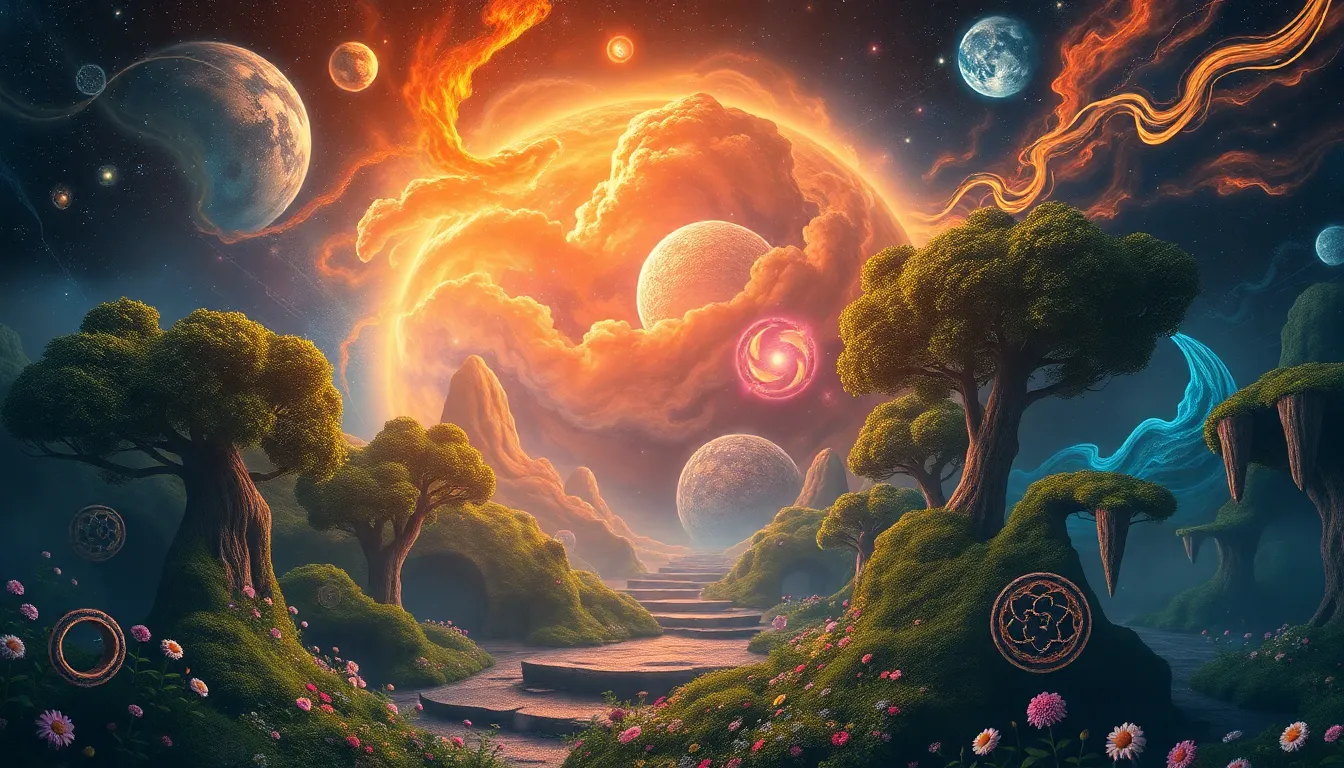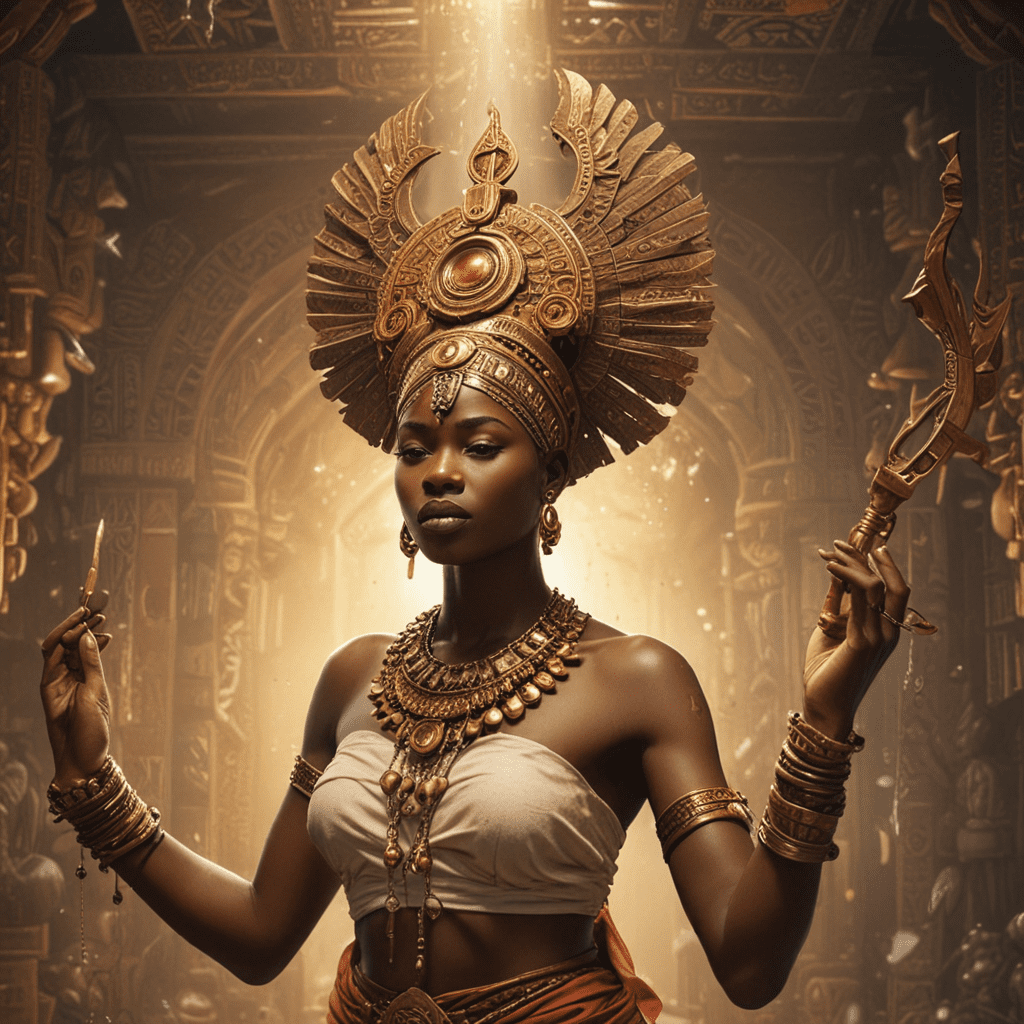The Cosmic Garden: Creation Myths That Nurture Our Souls
I. Introduction: The Role of Creation Myths in Human Culture
Creation myths serve as foundational stories that help societies understand their origins, the nature of the universe, and humanity’s place within it. These narratives are not mere tales; they are profound expressions of cultural values, beliefs, and the human experience.
The significance of creation myths lies in their ability to provide frameworks through which we can interpret our existence. They offer insights into existential questions and reflect the collective psyche of civilizations throughout history.
This article explores the themes surrounding the cosmic garden, its symbolism in creation myths, and how these myths continue to nurture our souls across cultures and epochs.
II. The Archetype of the Cosmic Garden
Gardens have long been symbolic in mythology, representing growth, fertility, and the nurturing aspects of nature. The archetype of the cosmic garden encapsulates a space where life flourishes, serving as a microcosm for the universe.
- Symbolism of Gardens: In many cultures, gardens symbolize paradise, a sacred space for reflection, and a connection to the divine.
- Metaphor for Creation: The garden often represents the beginning of life, showcasing the intricate balance of ecosystems and the interdependence of all living beings.
- Nurturing the Soul: The concept of a cosmic garden suggests that by understanding our origins and our connection to nature, we can nurture our own souls.
III. Ancient Civilizations and Their Creation Myths
Throughout history, ancient civilizations have crafted creation myths that reflect their understanding of the world and the divine.
A. Mesopotamian Myths: Enuma Elish and the Garden of Eden
The Enuma Elish, a Babylonian creation epic, describes the birth of the gods and the formation of the world from chaotic waters. Similarly, the Garden of Eden in Judeo-Christian tradition symbolizes a perfect creation, a paradise where humanity’s relationship with nature is harmonious.
B. Ancient Egyptian Creation Stories: Atum and the Primordial Waters
In ancient Egypt, Atum created himself from the primordial waters of chaos, representing the emergence of order from disorder. The lushness of the Nile and the gardens associated with it portrayed a divine gift that nurtured life.
C. Greek Mythology: Gaia, Uranus, and the Birth of Life
In Greek mythology, Gaia (Earth) and Uranus (Sky) symbolize the nurturing aspects of creation, with their union producing the Titans and, ultimately, all life. This myth emphasizes the interconnectedness of earth and sky, highlighting the garden as a sacred space for growth.
IV. Indigenous Perspectives on Creation
Indigenous cultures around the world possess rich creation narratives that emphasize the sacredness of the earth and the interconnectedness of all beings.
A. Native American Creation Stories and the Earth as a Living Entity
Many Native American tribes view the earth as a living entity, with creation stories that celebrate the land’s gifts. These narratives often highlight the importance of harmony with nature and the responsibility of stewardship.
B. Australian Aboriginal Dreamtime: Connection to Land and Spirit
The Dreamtime represents the time of creation for Aboriginal Australians, where ancestral beings shaped the land and established the laws of existence. This deep connection to land emphasizes the spiritual significance of nature.
C. African Creation Myths: The Role of Ancestors and Nature
African creation myths often involve ancestors who play crucial roles in the formation of the world. These stories underscore the relationship between humans and nature, emphasizing communal responsibility for the earth.
V. Eastern Philosophies and the Cosmic Garden
Eastern philosophies offer diverse perspectives on creation, intertwining spiritual concepts with the natural world.
A. Hindu Cosmology: The Cycle of Creation and Destruction
In Hinduism, the trinity of Brahma (the creator), Vishnu (the preserver), and Shiva (the destroyer) illustrates the cyclical nature of existence. The cosmic garden embodies this cycle, emphasizing rebirth and renewal.
B. Chinese Mythology: Pangu and the Creation of the Universe
Pangu, a primordial giant, is said to have created the world by separating the heavens from the earth. His body became the landscape, illustrating a profound connection between nature and creation.
C. Buddhist Views on Creation and Interconnectedness
Buddhism offers a unique perspective on creation, emphasizing the concept of interconnectedness and the impermanence of all things. The idea of a cosmic garden reflects the balance and harmony necessary for spiritual growth.
VI. The Role of Nature in Creation Myths
Nature plays a pivotal role in creation myths, with various elements symbolizing different aspects of existence.
A. The Elements (Earth, Water, Air, Fire) and Their Significance
- Earth: Represents stability and nourishment.
- Water: Symbolizes life, purification, and rebirth.
- Air: Associated with breath and spirit.
- Fire: Represents transformation and energy.
B. Animals as Symbols in Creation Narratives
Animals often embody various traits in creation stories, serving as messengers or guardians. They remind us of our connection to the natural world and the importance of coexistence.
C. The Impact of Seasonal Cycles on Creation Stories
Seasonal cycles reflect the rhythms of life and death, growth and decay. Many creation myths incorporate these cycles, emphasizing the importance of change and renewal.
VII. Modern Interpretations of Creation Myths
Contemporary thinkers have begun to reinterpret ancient creation narratives in light of modern science and spirituality.
A. How Contemporary Thinkers Reinterpret Ancient Narratives
Scholars and spiritual leaders are uncovering new meanings in creation myths, exploring their relevance in today’s world. These reinterpretations often focus on ecological responsibility and the need for harmony with nature.
B. The Influence of Science and Cosmology on Creation Myths
Advancements in science and cosmology challenge traditional creation myths, prompting new narratives that blend scientific understanding with spiritual insights.
C. The Resurgence of Interest in Spirituality and Nature
In recent years, there has been a resurgence of interest in spirituality and the natural world, leading to a revival of creation myths as tools for personal and collective growth.
VIII. The Healing Power of Creation Myths
Creation myths possess a unique healing power, offering comfort and understanding during challenging times.
A. How These Myths Provide Comfort and Understanding in Times of Crisis
In moments of crisis, creation myths can serve as a source of solace, reminding us of the cyclical nature of life and the potential for renewal.
B. The Role of Storytelling in Mental and Emotional Healing
Storytelling fosters connection and understanding, allowing individuals to process their experiences and find meaning in their struggles.
C. Lessons from Creation Myths That Can Nurture the Soul
Creation myths teach us valuable lessons about resilience, interconnectedness, and the importance of nurturing our environment and ourselves.
IX. Creating Personal Myths: Nurturing Your Own Cosmic Garden
Individual narratives play a crucial role in personal growth and self-discovery.
A. The Importance of Personal Narratives in Individual Growth
Creating personal myths allows individuals to explore their identities and experiences, fostering a deeper understanding of themselves and their place in the world.
B. Techniques for Cultivating Your Cosmic Garden
- Journaling: Writing about your experiences and aspirations can help clarify your personal narrative.
- Connecting with Nature: Spending time in nature can provide inspiration and a sense of belonging.
- Engaging in Creative Expression: Art, music, and storytelling can be powerful tools for exploring and expressing your personal myth.
By nurturing your own cosmic garden, you can cultivate a deeper connection to yourself, others, and the universe, allowing the stories of creation to resonate within your soul.



